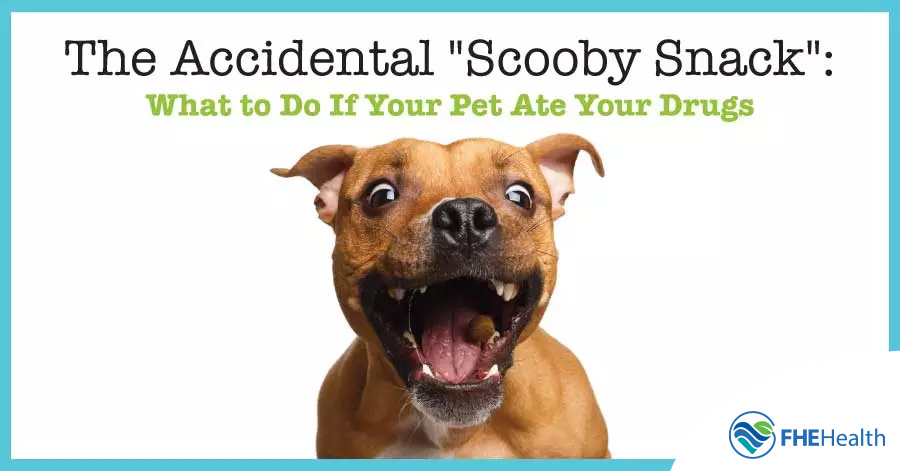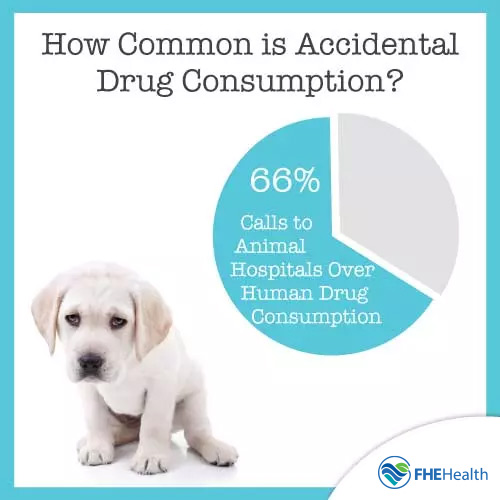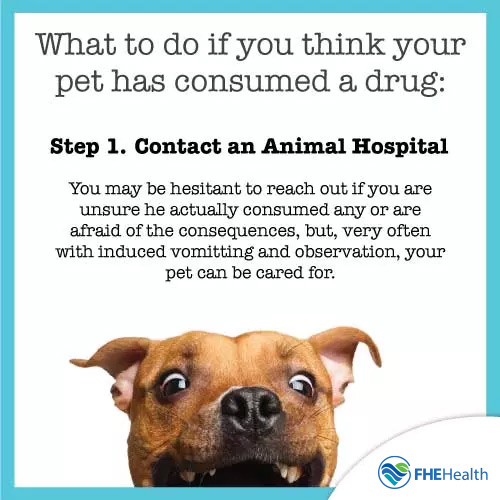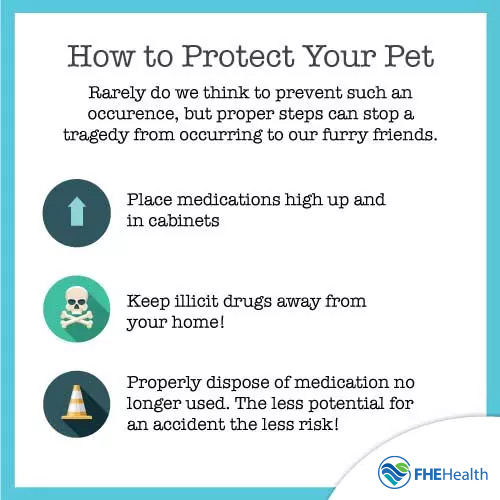
Owning a pet can be a wonderful addition to your life, providing a companion and a friend that offers support in a way human relationships often can’t match. Pets have a lot to offer, with clinically proven benefits like increased fitness, lower stress levels and brighter moods.
Despite the bond you have with your pet, however, providing information can be a little challenging. While most pets can learn simple commands like “sit,” “stay” or “no,” you can’t hold a true conversation, and there’s no good way to share the dangers of drug consumption. Even scarier is when you aren’t sure if your pet ate drugs. We generally find the aftermath; a chewed container, strange behavior, knocked over containers. Hollywood has an often used trope of a pet consuming a drug and having a personified reaction, but the reality is, when your pet consumes a drug, their life may be in danger.
With 66 percent of poison-related calls coming into pet hospitals concerning the consumption of a human drug, the challenges facing drug ingestion are all too common. If your pet consumed drugs, getting immediate help is absolutely critical.
Pets and Prescription Drugs
 Prescription medications are very commonly used in the United States, with nearly 50 percent of the population taking at least one drug in the last 30 days and 12 percent using five or more. This doesn’t account those people using prescriptions illegally or recreationally. As such, the average cat or dog has a significant opportunity to ingest drugs if medications are not properly contained. Cats are far less likely to eat drugs than dogs are (accidents notwithstanding, most cats are quite picky about their diet) but pills left out in the open and not in a proper storage container are a threat to every animal.
Prescription medications are very commonly used in the United States, with nearly 50 percent of the population taking at least one drug in the last 30 days and 12 percent using five or more. This doesn’t account those people using prescriptions illegally or recreationally. As such, the average cat or dog has a significant opportunity to ingest drugs if medications are not properly contained. Cats are far less likely to eat drugs than dogs are (accidents notwithstanding, most cats are quite picky about their diet) but pills left out in the open and not in a proper storage container are a threat to every animal.
If you suspect your pet has consumed drugs that were not prescribed by a veterinarian, contacting a medical professional should be your first step. In the U.S., numerous pet poisoning hotlines are available including a helpline provided through the ASCPA. Note that a fee may apply.
When you call a vet’s office or an emergency hotline, do your best to identify the specific pill, the dosage and the number of pills consumed. If the quantity isn’t known, this is okay. However, vets may proceed with more caution due to the increased risk.
Should a vet or vet tech determine that medication is potentially dangerous, he or she will likely instruct you to go to your local vet’s office or pet hospital. There, your vet will utilize activated charcoal to induce vomiting and prevent the absorption of drugs remaining in the system. If the type of drug or quantity of drug poses a particular threat to your pet, your vet may ask to keep your pet under 24-hour observation.
In general, with proper care, most ramifications to dogs are mild and outcomes are positive. Cats, on the other hand, are far more likely to suffer serious side effects due to both their smaller size and increased difficulty in metabolizing human medications.
Pets and Illicit Drugs
 If you find that your pet consumed an illegal drug like heroin, cocaine, meth or marijuana, getting help is equally important. While some drug users may be hesitant to get professional help as doing so would result in the disclosure of a drug habit, this should not be a point of concern. Vets are not interested in the legality of your drug use but rather the health and safety of your pet.
If you find that your pet consumed an illegal drug like heroin, cocaine, meth or marijuana, getting help is equally important. While some drug users may be hesitant to get professional help as doing so would result in the disclosure of a drug habit, this should not be a point of concern. Vets are not interested in the legality of your drug use but rather the health and safety of your pet.
Follow the same steps as you would with any other drug ingestion, by contacting a helpline and following all directions. Some drugs, like those potentially cut with more serious substances such as fentanyl, can be particularly problematic, so be sure to disclose these kinds of risks if appropriate. Festival drugs like Ecstasy and LSD can also cause overdose, even though this is rare in humans.
Illicit drugs can be far more dangerous than prescription drugs, largely due to the unknown nature of the composition of substances sold on the street. Speed is often of the essence. Overdose is more likely in a smaller body, so quick action can be the difference between life and death.
If you are not near a vet (for example, at a remote party with no transportation), it may be possible to induce vomiting in your dog using small amounts of hydrogen peroxide at one teaspoon per 10 pounds. Never attempt to induce vomiting if your dog is already showing symptoms of drug ingestion, and do not use hydrogen peroxide on cats. Further, stay away from internet remedies like oil, milk or salt.
My Dog Ate Marijuana: What Do I Do?
One of the most overwhelmingly common issues with pets and drugs is dogs eating weed. With marijuana becoming a more common drug in the home, and perhaps, less need to ‘hide it away’, dogs are finding their way into it more than ever. When marijuana is in edible form, the dog might mistake it for ‘people food’, and when it is in bud/grass form, they may also consume it. The size of your dog and the amount of marijuana eaten will be a significant outcome in the reaction, but if they eat too much, they could die. They will likely begin to show signs of lethargy (laziness), breathing problems, and poor balance.
Protecting Your Drugs
If you use drugs of any kind, proper care is very important. Follow these tips to keep your drugs out of reach of your pets.
- Always keep medication or illicit drugs on high shelves and out of sight.
- Keep vials, bags, and envelopes sealed.
- Make sure all prescription drug containers are clearly labeled; if your pet chews on an entire vial, reading a label may no longer be possible.
- Take all drugs over a sink or counter so that accidents will not result in drugs on the floor.
- Know the names and doses of all prescription drugs.
- Don’t keep illicit drugs inside your home at all, and keep them away from pets and children.
Seeking Help for Drug Abuse
 If you are in a position to leave illicit drugs unattended throughout your home, whether out of carelessness or after getting high, an issue may be indicated. Quantities large enough for a dangerous level of consumption can also indicate problematic behavior, including a substance use disorder. If your drugs have previously caused problems for your own health or the health of your pets, getting help may be the best possible path forward.
If you are in a position to leave illicit drugs unattended throughout your home, whether out of carelessness or after getting high, an issue may be indicated. Quantities large enough for a dangerous level of consumption can also indicate problematic behavior, including a substance use disorder. If your drugs have previously caused problems for your own health or the health of your pets, getting help may be the best possible path forward.
At FHE Health, we are available to offer support and guidance to those facing drug addiction and mental health challenges. If your behavior, including the accessibility of illegal drugs in your home, demonstrates signs of a problem, help is here. Please contact us today for a confidential intake consultation.






